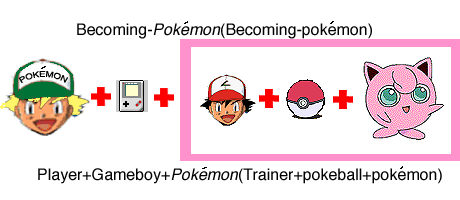This illustration was snatched from the following website: http://www.lclark.edu/~soan370/mythdiagram2.html

Velocity(v) is equal to the change in distance(d) over the change in time(t).
The equation for acceleration:

To compute acceleration, velocity occupies the "distance" position of the velocity equation. In other words, distance is to velocity what velocity is to acceleration. In a virtual world, where distance or space is of little importance next to the speed of information transfer, speed is the "distance" and rates of "acceleration" are the new velocity. In this scheme, the rate of change is vector of progress, rather than the steady pursuit of a goal. This situation resembles Moore's Law, which states:
The observation made in 1965 by Gordon Moore, co-founder of Intel, that the number of transistors per square inch on integrated circuits had doubled every year since the integrated circuit was invented. Moore predicted that this trend would continue for the foreseeable future. In subsequent years, the pace slowed down a bit, but data density has doubled approximately every 18 months, and this is the current definition of Moore's Law, which Moore himself has blessed. Most experts, including Moore himself, expect Moore's Law to hold for at least another two decades. ("Moore's Law")
To put it plainly, the rate of technological change has created a sort of "Moore's Law of Cultural Change" for an information economy.
5. A diagram of "becoming-becoming-pokémon."

The pink section of the diagram illustrates the process of becoming-pokémon through the trainer-pokeball-pokémon assemblage. One level above this assemblage is the process of becoming-Pokémon through the player-gameboy-Pokémon assemblage. Since the process of becoming-Pokémon involves playing the game which consists of a narrativized version of becoming-pokémon
6. According to an ABCNews online article from March 28, 2001:
Saudi Arabian authorities have decreed that there's no place for the imaginary, superpowered creatures that make up the Pokémon universe in the Islamic state. The country's highest religious authority issued a fatwa against Pokémon cards and games.Accusing the immensely popular game of "possessing the minds" of children while promoting Zionism and gambling, Saudi Arabia's Higher Committee for Scientific Research and Islamic La issued the fatwa, or religious verdict, this weekend.
The entire article is available online at: http://abcnews.go.com/sections/world/DailyNews/pokemon010326.html